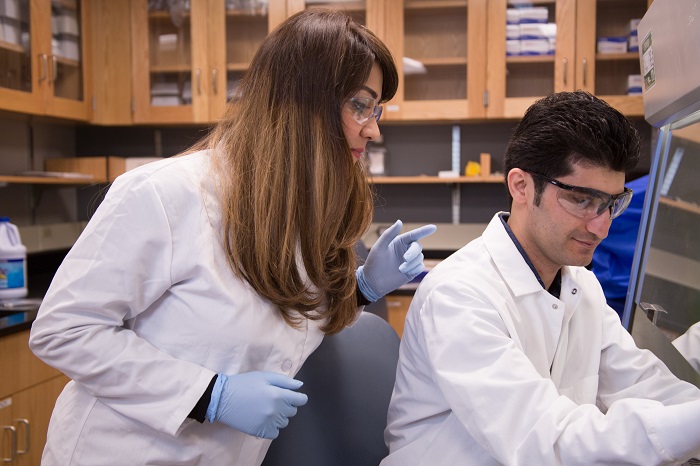Annabi Awarded 2nd NIH R01 Grant

 ChE Assistant Professor Nasim Annabi received her second R01 grant ($3.1M) from the National Institutes of Health (2017-2022) for a project entitled “Engineering highly elastic surgical sealants with hemostatic properties“. This project is focused on the development of a protein-based nanocomposite hydrogel with hemostatic properties to control bleeding during and after surgical procedures. Professor Annabi’s team will integrate nanomaterials with an advanced bioadhesive hydrogel developed in her lab to engineer this novel hemostatic sealant. The proposed material is made of a highly elastic human protein, which can immediately stop bleeding after applying and lead to tissue regeneration and repair over time.
ChE Assistant Professor Nasim Annabi received her second R01 grant ($3.1M) from the National Institutes of Health (2017-2022) for a project entitled “Engineering highly elastic surgical sealants with hemostatic properties“. This project is focused on the development of a protein-based nanocomposite hydrogel with hemostatic properties to control bleeding during and after surgical procedures. Professor Annabi’s team will integrate nanomaterials with an advanced bioadhesive hydrogel developed in her lab to engineer this novel hemostatic sealant. The proposed material is made of a highly elastic human protein, which can immediately stop bleeding after applying and lead to tissue regeneration and repair over time.
Sutures, wires, and staples are widely used for surgical wound closure, in order to restore the structure and function of tissues after surgical procedures. Despite their common use in the clinic, these methods are not adequate for applications that involve highly elastic tissues, such as lung, heart, muscle, and blood vessels. This is mainly because certain mechanical compliance is desired to allow proper tissue motility and function. In addition, uncontrolled bleeding in surgical settings often leads to significant clinical and economic impact. If not managed properly, surgical bleeding can prolong the duration of the surgery and bring about the need for blood transfusions. Surgical adhesives, sealants, and hemostats have emerged as attractive alternatives or adjuncts to conventional wound closure methods, due to their ease of application and versatility. These materials can close the incision more quickly and effectively compared to sutures, which reduces the risk of infection and blood loss by the patient.
 Although several types of hemostats and sealants have been developed, existing surgical materials do not provide sufficient mechanical strength and appropriate elastic compliance. In addition, they often exhibit low tissue adhesion, particularly to wet surfaces, such as in the presence of blood. Therefore, there is an unmet need for a novel surgical material that has combined properties of strong adhesion to wet surfaces, elasticity and mechanical strength, and the ability to control bleeding, outperforming the currently available sealant products and hemostatic agents.
Although several types of hemostats and sealants have been developed, existing surgical materials do not provide sufficient mechanical strength and appropriate elastic compliance. In addition, they often exhibit low tissue adhesion, particularly to wet surfaces, such as in the presence of blood. Therefore, there is an unmet need for a novel surgical material that has combined properties of strong adhesion to wet surfaces, elasticity and mechanical strength, and the ability to control bleeding, outperforming the currently available sealant products and hemostatic agents.
Professor Annabi shares, “In collaboration with clinicians, we have planned to develop the next generation of surgical materials by combing natural proteins with biocompatible nanoparticles. Our proposed material can control internal bleeding and facilitate wound healing.”
The NIH fund will support Annabi and her collaborators to test this novel surgical material in different large animal models prior to first phase human trial.